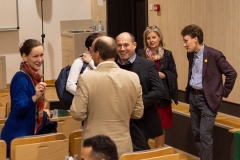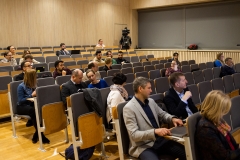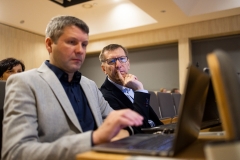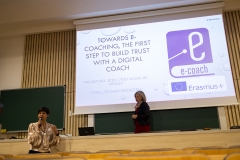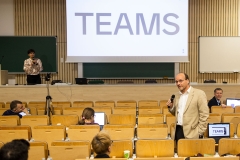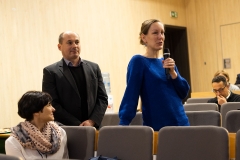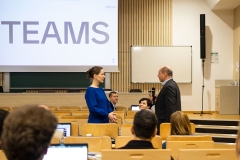„Towards E-Coaching” conference – multiplier event
21-02-2023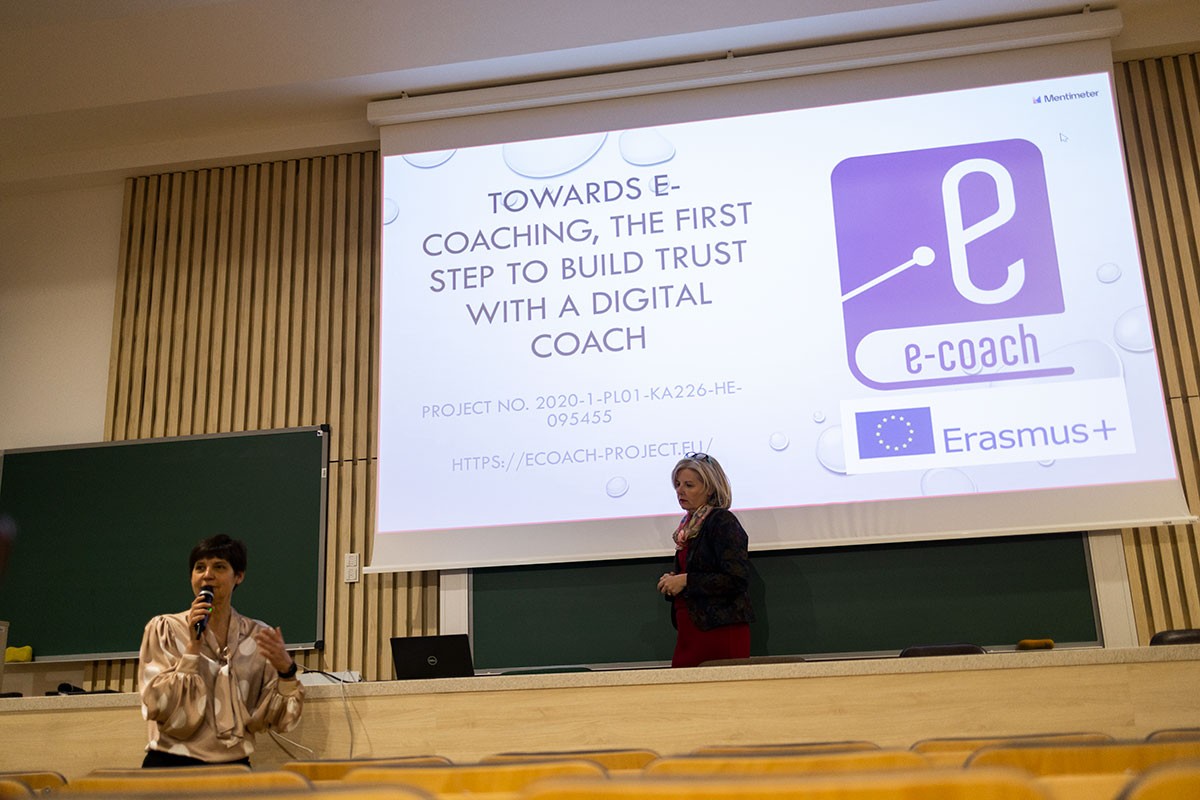
The meeting on 21-22 February 2023 was attended by representatives of the universities involved in the project: Bialystok University of Technology Faculty of Computer Science, Tampere University of Applied Sciences (Finland), Leipzig University (Germany) and Technical University of Crete (Greece). Thanks to online streaming, the conference speeches were also listened to by academics from India, Romania, Turkey and Poland. During the conference, in addition to presenting the results of the project, the developed methodology and the e-book containing its description were discussed. Participants also got acquainted with dedicated courses on the methodology for teachers and students, made public on the e-learning platform ecoach.coursevo.com On the second day of the conference, specialists from Tampere University of Applied Sciences (Finland) conducted a workshop on the methodology of coaching in online courses, and specialists from the BUT Faculty of Computer Science presented the results of pilot classes with students using the methodology.
E-COACH International Conference programme (PDF, 766 KB, It will open in a new tab)
In 2021, the Faculty of Computer Science of Bialystok University of Technology (project leader) proposed to three European universities to participate in a consortium and jointly prepare an answer to the challenge facing higher education in the era of the COVID-19 pandemic, namely how to effectively engage students with on-line learning. These consortium activities conducted under the name “Towards e-coaching. The first step to build trust with a digital coach,” the Erasmus+ National Agency supported under Action 2, Strategic Partnerships for Digital Education in the Higher Education sector with a grant of €254,729.00.
The coordinator of the “Towards e-coaching” project is Assoc. Prof. Dorota Mozyrska, DSc, PhD, Dean of the Faculty of Computer Science of Bialystok University of Technology. She was assisted by a project team that included faculty members and Piotr Wołejsza, PhD of the Maritime University of Szczecin.
– It’s a project for the pandemic times talking about modern remote education and assistance in this education. We’ve learned about remote learning, we’ve learned how to use the tools, but we haven’t gone very far with the methodology when teaching remotely. So what methodology should we use to activate learners, by motivating, activating, building trust? We took on the challenge of creating a new methodology that combines coaching and remote work – explains Prof. Dorota Mozyrska.
The theoretical part of the project, concerning the development of an e-coaching methodology, was carried out by experts in didactics and methodology from the Tampere University of Applied Sciences and the University of Leipzig (Universitaet Leipzig, Germany). The project developed training and e-learning courses, made available on the ecoach.coursevo.com platform prepared by Polytechneio Kritis in Greece.
Using the training materials, employees of the Faculty of Computer Science conducted pilot sessions with technical students in the subjects of entrepreneurship, programming, mathematical analysis and linear algebra. This resulted in 12 videos of face-to-face remote meeting sessions with first-year students.
– These pilot videos of classes in Polish will be published with a transcription on the Bialystok University of Technology’s You Tube channel. This is something the Internet has not yet seen. Until now, I haven’t found such recordings online. I think no one wants to show what remote classes can look like from the inside. We have done it, showing how to implement e-coaching methods in practice – stresses Prof. Mozyrska.
Results of the project “Towards e-coaching. The first step to build trust with a digital coach”, Erasmus+ Strategic Partnerships for Digital Education in the Higher Education Sector programme:
- innovative didactic methodology for distance learning (E-Coach), which will lay the groundwork for building trust between the parties to the educational process;
- an integrated e-learning platform on the application of the E-Coaching methodology, including an activation programme for teachers;
- pilot examples of e-coaching courses, i.e. 12 registered classes in Mathematical Analysis, Algebra, Programming and Entrepreneurship using the innovative e-coaching methodology dedicated to higher education institutions.
The project “Towards e-coaching. The first step to build trust with a digital coach” was one of three initiatives undertaken by Bialystok University of Technology in the competition of the Polish National Agency of the Erasmus+ Programme under Action 2, Strategic partnerships for digital education in the higher education sector. In the period 2021-2023, our university implemented the project “Holistic approach towards problem-based ICT education based on international cooperation in pandemic conditions (ICT_EDUPAND)” (budget: EUR 234,700.00) and “Advanced Digital Design course ON modern buildings developing SKILLS for young engineers (ADD-ON_SKILLS)” (budget: EUR 261,018.00). All three projects were concerned with the development of digital education. They resulted in publications, didactic digital databases, courses, remote learning modules. Trainings and workshops were conducted in the international community of teachers, aimed at making online didactics more attractive and effective.
Their importance for the internationalisation of Bialystok University of Technology is emphasized by Assoc. Prof. Dorota Anna Krawczyk, DSc, PhD, Eng, Vice-Rector for International Cooperation at Bialystok University of Technology.
– The benefits of our university undertaking international projects are multidimensional. On the one hand, they help us build a network of contacts with foreign partners and strengthen the ones we already have, and we want them to bear fruit with more projects in the future. On the other – they are important for our teachers, mainly for their individual development. In the course of such a project, you can greatly develop your competences, learn from colleagues from other countries, compare how teachers from Europe prepare given topics at home, what point of view, experiences they have. They could not make such observations without international contacts, which is the crux of the project. Moreover, international projects are of great importance for our students, as they largely provide new teaching methods, modern teaching tools and materials for their introduction. This greatly improves the quality of education of Bialystok University of Technology students. The effects of international projects stay for years and can be used both by project participants and any other interested teachers – says Assoc. Prof. Dorota Anna Krawczyk, DSc, PhD, Eng, Vice-Rector for International Cooperation at Bialystok University of Technology.
by mr
